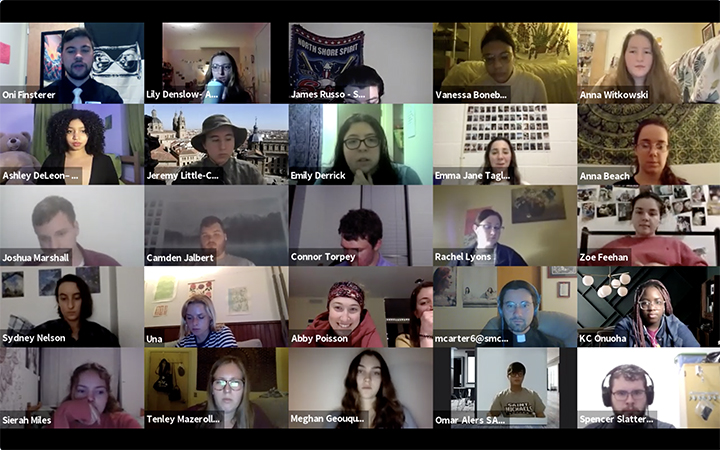
Association fails to meet quorum last week
By Bobby Grady
Staff Writer
A list of demands for racial justice were presented at the Student Government Association (SGA) Senate meeting on March 23. Due to low Senate attendance, the SGA failed to meet quorum.
This is the second time in the College’s history that the SGA Senate failed to meet quorum.
The list of demands are centered around “propagating a greater sense of feeling and belonging,” according to James Russo ’21, secretary of Student Policy. Russo has held an SGA position for two years.
In order to even vote on these matters, Senate meetings must meet quorum. “A quorum is when we have half plus one sitting Senate members attend an SGA meeting, anything less and the only votes than can be held are those regarding adjournment,” Russo said. Essentially, without the quorum, nothing can be voted on. On March 23, an emergency meeting was held to vote on the demands, and the SGA failed to meet quorum due to lack of attendance.
Last Tuesday, they met quorum. The SGA debated and voted on several significant issues. The first vote that occurred was the approval of last week’s minutes, followed by a vote to approve the list of demands presented the previous week. The motions passed. Next, the Senate voted to suspend four clubs and terminate two. A club can be suspended or terminated for violating the SGA constitution, or if the club violates a federal or state law. Clubs can also be suspended or terminated if they are inactive. Suspended clubs still exist, but cannot access their funding until they prove to the Senate that they are able to meet the requirements needed for club status, according to Russo. A terminated club will no longer exist.
Last week, the clubs voted for termination and suspension were all inactive. The motion to suspend the Business Society, Psychology Club, Knitting Club and Track club passed. Water Polo and the Japanese Culture Club were terminated.
Following suspensions and terminations was the impeachment of a first-year representative. However, there was not much debate, as the member being impeached had transferred schools and never officially resigned from SGA. This forced the SGA to commence the impeachment trials.
Normally, SGA Senate meetings at St. Michael’s College are filled with students in Cheray 101 debating ideas that can benefit student life. Though COVID-19 forced the SGA to hold all meetings virtually, members of the organization are still working to safely engage with the student body.
In its simplest form, the SGA is a student organization composed of elected class officers, club and area representatives, faculty and staff advisors, and an appointed executive board. Members of the SGA meet to discuss how they can improve the college experience and address student concerns. The purpose of the SGA is to be a liaison between the student body and administration. The organization also works to ensure strong feelings of belonging for every student.
Despite all the SGA has accomplished at Senate meetings, they are not as lively as they used to be. Throughout Russo’s tenure, the sounds of strong debate amongst the Senate are familiar, but not as lively now that meetings are held over Zoom.
Though engagement is lower, according to Russo, the productivity of the meetings has not slowed down at all. “I’d say this has probably been one of the most productive e-boards in recent years,” he said.
Russo is not the only one who noticed these changes.
Tenley Mazerolle ’21, secretary of finance and veteran member of the SGA, has also noticed that discussions at Senate meetings haven’t been as active as they have been in the past, but the SGA is still accomplishing what they need to.
“The Senate would ask a lot more questions and just be more involved during my first and second year,” Mazerolle said. But much like Russo, she suspects that COVID has impacted the engagement of the Senate. “The end of last year and all of this year was totally different because of COVID,” she said.
Russo said he is hopeful that next year will be different. He is confident that the incoming executive board will be able to transition back into in-person Senate meetings.
“I have high hopes for the SGA moving forward because we have adapted very well … and I see nothing but better things coming once COVID rolls over,” Russo said. A big change the SGA had to overcome was how to get work done remotely. They were able to persevere through this when they released the COVID student learning survey last semester, and all of the work that went into making and distributing the survey online.
The SGA has helped many people and those who have participated are able to take their experience and use it in the real world. Rob Robinson, vice president of finance, has been an SGA advisor for over 10 years, and has witnessed how the SGA can impact students and help them develop leadership and organizational skills to help them in careers after College.
He worked with Nicole Ouellette, former secretary of finance for two years, and she went on to work at the Green Mountain Higher Education Consortium after graduation. Her work there includes finding “points of collaboration,” Robinson said, and that “it was great to see someone like Nicole get a first out of college job at the consortium.”

